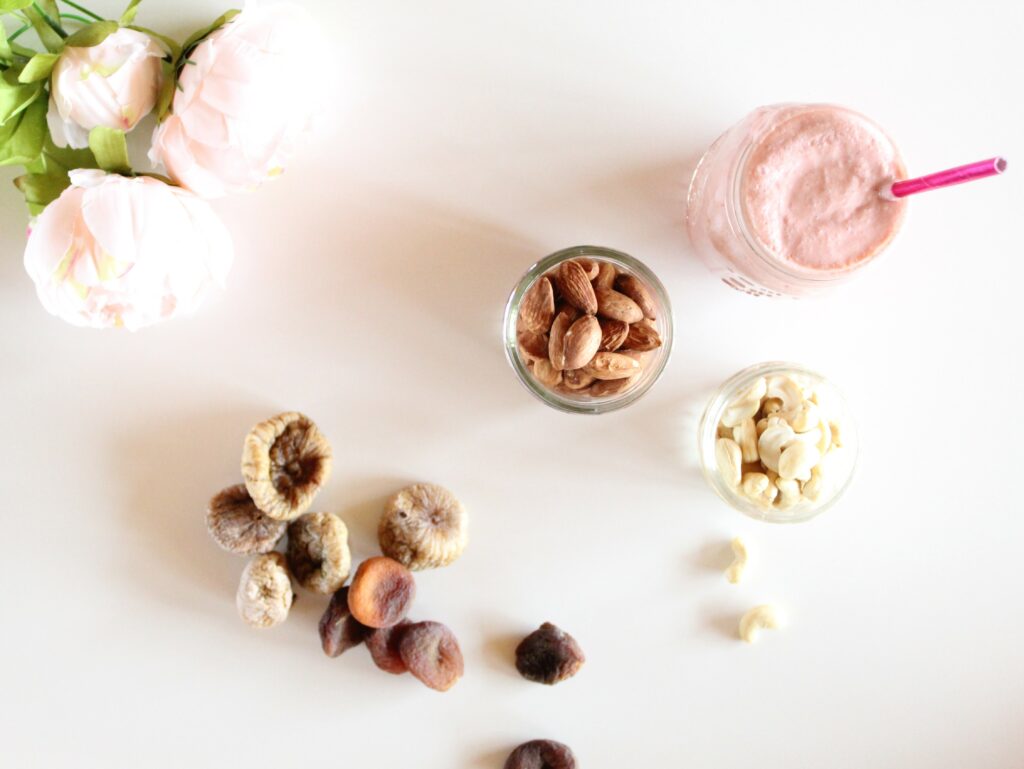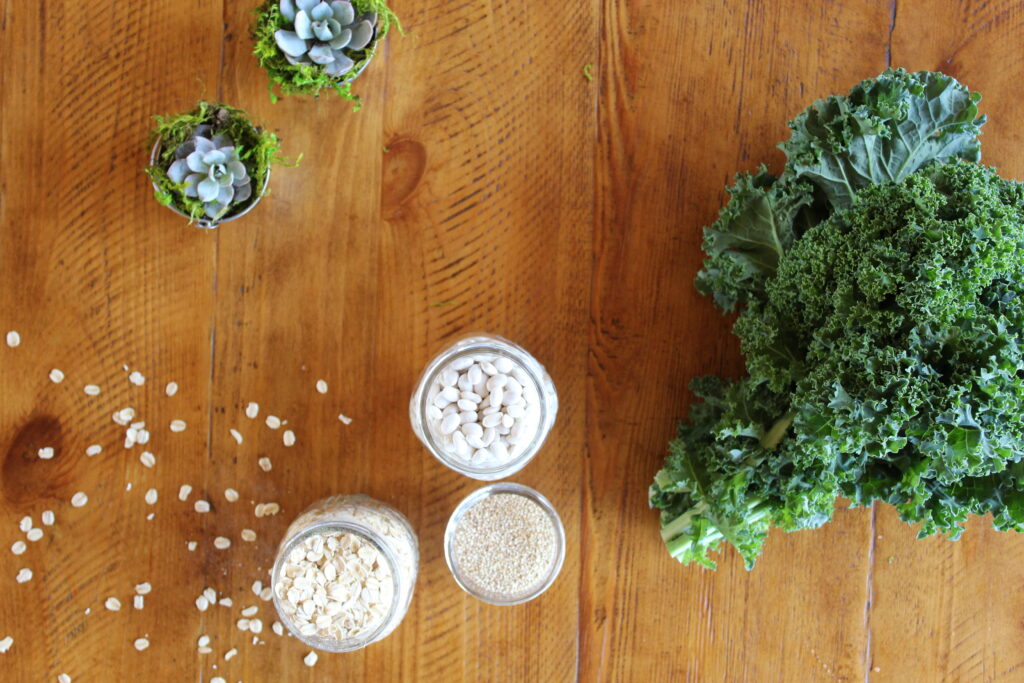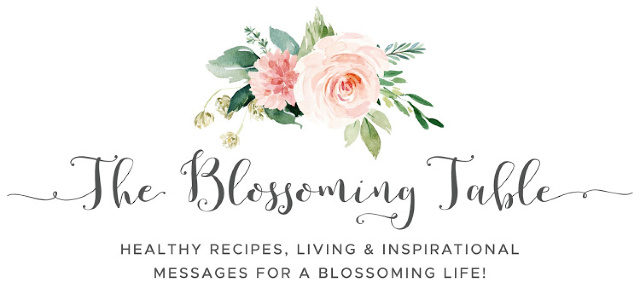
Finding blood sugar balance so is important in all of us! Unstable blood sugars can lead to fatigue, anxiety, hormone dysregulation, exhaustion, insomnia, depression, brain fog, and even Type II Diabetes.
I am not a diabetic but as a former nurse, I have taken care of many diabetic patients who are dependent on insulin. It is a very serious thing! Even though I am not a diabetic I do struggle with low blood sugar (although I have never been diagnosed as hypoglycemic). The more I learn + listen to my body the more I realize how important it is to balance my blood sugars on a daily basis to help feel my best!
The control of blood sugar is one of the most fundamental requirements for a healthy life. -Tom Cowan
I’m going to get a little science-y on you here but I think it’s important so you understand how important balancing your blood sugar is. Just writing and doing the research I have learned so much!
Hypoglycemia (low blood sugar) and hyperglycemia (high blood sugar) are two very different things.
Hypoglycemia is when your blood sugar is less than 80. When your blood sugar drops below this point is when you start to feel shaky, anxious, or irritable. “Hangry” is a real thing…at least in me:). When your blood sugar drops your amazing body is ready to react by producing dozens of hormones to raise your blood sugar. One of those hormones being adrenaline (fight or flight hormone) which makes your blood sugar available to your cells + accounts for the shaky feeling.
Hyperglycemia is characterized when your blood sugar rises above 110. Our body only has two ways to deal with high blood sugar. One being exercise…muscular activity drives the sugar from the blood into the muscle cells where it is used as fuel. #2 being insulin…insulin production is the body’s way of saying that your sugar level is too high and then insulin helps remove sugar from the blood and puts in into the cells where it is stored as fat.
There are two types of diabetics associated with hyperglycemia…Type I and Type II Diabetes.
Type I Diabetes, also known as insulin-dependent diabetes, usually develops before the age of 30 and involves a malfunction of the pancreas. It is thought of as autoimmune disease where something causes the body’s immune system to attack its own insulin-producing cells, called the beta-cells, where eventually the pancreas loses its ability to produce insulin. Insulin is something we all need to survive. Insulin uses glucose from the food we eat and turns it into energy for now + stores more the future. We would starve to death without insulin!
Type II Diabetes is when your blood sugar is too high. This is caused when the consumption of foods over many years that raise blood sugar continues to exceed the amount of sugar needed by the muscles for exercise. When the sugars are too high this forces the body to make more insulin to the point where the body can’t make enough to lower the sugar levels, causing chronically high blood sugars and type II diabetes. When the regulation of carbohydrate intake matches the exercise level, type II diabetes cannot develop.
Alarming fact…chronic blood sugar imbalances and their inflammatory effects are now suspected to play a large role in the development of dementia and Alzheimer’s — enough so that some researchers and practitioners are calling Alzheimer’s “Type 3 diabetes” due to the inflammatory blood sugar connection. -Datis Kharrazian.
You can see how important proper blood sugar regulation is on the body. Too little and too much both can have serious negative consequences. It wasn’t until recently I realize how much my blood sugar affects me when I go too long without eating or don’t eat a balanced diet…my anxiety level increases and I just don’t feel good.
My naturopath recommended I eat every 2-3 hours to keep my blood sugar + energy up. Low energy is something that I have struggled with for a long time. I believe a lot of it is due to stress (more on that below) but also because I wasn’t eating enough, in particular, a balanced diet with carbs, protein, and fat.
I did Whole30 (see my post for more info on this) and I did not feel well. My skin was breaking out and I was always hungry all the time! I believe I wasn’t getting enough carbs. I was explaining to a friend my symptoms on Whole30 thinking it was something I was eating that my body was reacting too…but she said something that struck a cord, “maybe it was something you were missing”….
This makes total sense because we need carbohydrates (not too much + the right kind…that whole balance thing again;)). Even while on the Paleo diet (I’ve been doing this for a couple of years now) my body craved carbs and I would eat sprouted quinoa. My body felt “drained” without them. Note…I was addicted to carbs before I started the Paleo diet (whole boxes of wheat thins addicted)…the carb craving I’m talking above does not feel like the same thing.
Carbohydrates are not only our main source of energy…they are fuel for the brain. A low carbohydrate diet can stress the body. They can also affect your adrenal glands (fight or flight glands), thyroid function and sex hormones. I believe I was throwing my hormones out of whack by not eating enough carbs. One article I read stated…
Prolonged avoidance of complex carbohydrates can push one to a state of extreme slow oxidation, adversely affecting thyroid and adrenal functions even further and may interfere with the production of hormones, especially progesterone and thyroid hormones. Initially many people on a low-carb diet experience weight loss after eliminating refined carbohydrates but soon find that their metabolism declines, leading to more challenges with weight management, lethargy and decreased energy. –Kim Schuette, CN
Meal skipping didn’t help either. For a long time eating three meals a day was not the norm-I usually snacked for lunch unless we had leftovers. It hasn’t been until recently that I’ve really tried to make a point to eat three balanced (I still need to work on this part) meals a day. I definitely feel better when I do. I remember one time after a day of being out and about in town, coming home to tell my husband how good I felt when I stopped for a healthy lunch (I normally would just have a Larabar).
I’ll be completely honest here…sometimes I am afraid to eat too much because of gaining weight. I struggled with weight issues when I was younger and I don’t want to go back. However, I am learning that being healthy and feeling good is so much more important than a few extra pounds. I think as women we all struggle with some sort of this.
It’s not just about how often you eat but what you eat that is so important! Balanced diet and lifestyle, including exercise, is key!
A balanced diet consists of fats proteins and carbohydrates. In normal circumstance, carbohydrates are transformed into sugar and go into the blood. Fats are broken down into fatty acids that are building blocks for hormones, prostaglandins and cell membranes. Proteins are broken down into amino acids. Carbs only job is to generate energy.
“balanced” diet, which is one where the energy used in movement and exercise equals the energy provided by the carbohydrates we consume. -Tom Cowan
It’s so important that we eat quality carbs, fats, and proteins. Unrefined coconut oil, grass-fed organic butter + animal fats, organic extra virgins olive oils are key. Quality proteins including organic grass-fed meats are so important. Grass-fed dairy and meat provide more vitamin A, D, and K + more minerals. When the animal you are consuming is fed crappy food = crap you are feeding your body. Quality carbs are just as important, including properly prepared grains. See below for tips!
Traditionally grains were consumed whole and after being soaked or fermented. Modern science has been able to discover the importance of this ancient practice. All grains contain phytic acid (an organic acid in which phosphorus is bound). Unreleased phytic acid binds to certain minerals such as calcium, copper, iron, magnesium, and zinc preventing their absorption in the intestinal tract. This can over time lead to conditions such as irritable bowel and leaky gut syndromes, and eventually much more serious disorders. Soaking allows enzymes and probiotic organisms to break down and neutralize phytic acid. It is important that soaking occurs in warm acidulated water, and to accomplish this, use real yogurt, homemade whey, lemon juice or raw apple cider vinegar. -Kim Schuette, CN (See this article for more tips).
With all of that being said. Here are some actual ways we can balance our blood sugar in our everyday lives!

Ways to Balance Blood Sugar in our Everyday LivesReduce Stress
Reduce Stress
I am putting this as #1 because I believe stress affects our bodies more than we realize. I know this is a big problem for me…that silly mind of mine!
Under stress, the adrenal glands produce adrenaline, an important stimulus for the production of glucagon, which raises blood sugar levels and allows the body to react with a “fight or flight” response. Chronic stress…results in constant outpourings of adrenaline resulting in overstimulation of glucagon to keep blood sugar levels high. The body then responds with increased production of insulin to bring blood sugar levels down. -Tom Cowan
When our blood sugar crashes and adrenal glands kick in this hormonal response can feel identical to anxiety.
I have some simple tips for stress reduction in my blog post…10 Ways to Help you Feel Happy in the Middle of Winter.
Exercise
Exercise works in two ways to help keep blood sugars low. One is, as stated above, exercise drives the sugar from the blood into the muscle cells where it is used as fuel. #2-lowers stress level…see above:).
Eat a balanced amount of quality Carbs, Proteins, and Fats with every meal
Fats consumed with carbohydrates lower the glycemic index. If eating a high-carb food or sweet…eat some fiber, fat or protein with it. They help to slow the rate that glucose is absorbed in the bloodstream and helps prevent “insulin shock”. One good tip is…although I have to be honest…I definitely don’t do this but I think its something to work towards…
Start with 50% of the diet from non-starchy vegetables; 10% from starchy vegetables, properly prepared grains and legumes; 15% from animals, wild fish or seafood protein; and 25% from fats. Observe energy level, sleep, elimination, body temperature, mental outlook and adaptability to stress. Then make dietary adjustments accordingly. -Kim Schuette, CN
Note: Stay clear of trans-fats when possible. Trans-fatty acids in partially hydrogenated food (mostly found in foods like french fries & processed baked goods) cause insulin resistance.
Choose nutrient-dense carbs
Some of these include… Sweet Potatoes, Brown Rice (soaked/sprouted), Oats (soaked/sprouted), Quinoa (soaked/sprouted), Beans (soaked/sprouted), White Potatoes, Winter Squash, Beets, Carrots, Dates, Buckwheat (soaked/sprouted) + it’s gluten-free.
Now these grains are not Paleo-approved but the more I learn the more I realize that we all have to find what works for our bodies & by soaking/sprouting your grains it makes them a lot easier to digest. I am still experimenting with adding more of these into my diet…
Try to avoid refined carbs (like white flour, white bread, pastries, sodas, snacks, pasta, sweets, breakfast cereals, and added sugars) that quickly move sugar into the bloodstream. White rice is the one exception in my option if you are already consuming a balanced diet (it’s a lot easier to digest than brown rice).
Eat at regular times
Three meals a day without skipping meals is important + snacks, if needed, especially a balanced breakfast.
If you are hypoglycemic you may need to eat every two to three hours (not a lot but at least some protein). Conscious snacking is one term I’ve heard recently where you eat a solid snack with at least some protein and fat to keep you going, rather than little snacks.
Avoid sweets and starchy foods before bed. This is especially bad if you are hypoglycemic. This will cause your blood sugar to crash during the night and then you adrenal glands will kick into action leading to restless sleep + waking up in the night with anxiety.
Think about avoiding/limiting caffeine
Caffeine stresses our adrenal glands even more. Even green tea can be too much of a stimulant for me at times that can cause me anxiety.
Avoid food allergies and sensitives.
Whenever a food creates an immune response, such as an allergy or intolerance, it also creates blood sugar instability and insulin surges. Common food intolerances are to gluten, dairy, eggs, corn, soy, and yeast. Eating these foods can create sugar cravings and fatigue after meals. To stabilize blood sugar and promote brain health, problem foods should be eliminated and the gut repaired.
Listen to your body
This has been such an important aspect in my life. I have a tendency to just want to get what I’m doing done before I get to that eating thing;). God’s design is amazing and He gave our bodies signals to let us know when we are in need. For me, it’s not just about hunger but its also listening to my body when I’m thirsty. I have noticed increased anxiety with thirst as well. I’m learning it’s about making my health a priority + finding balance!
Dear friend, I pray that you may enjoy good health and that all may go well with you, even as your soul is getting along well. -3 John 1:2
References
http://www.biodynamicwellness.com/recovering-low-carb-diet/
https://www.westonaprice.org/health-topics/farm-ranch/splendor-from-the-grass/
https://drknews.com/stabilizing-low-blood-sugar-key-many-autoimmune-inflammatory-brain-based-disorders/ https://drknews.com/stabilizing-low-blood-sugar-key-many-autoimmune-inflammatory-brain-based-disorders/
https://ellenvora.com/6-tips-for-managing-anxiety-naturally/
https://flourish-living.com/women-low-carb-diets/
https://www.prevention.com/food-nutrition/healthy-eating/g25335049/healthy-carbs/

Great post, Alicia — very informative! I would love to see recipes that would be good to take to a potluck or friend’s house when someone you know has Type II diabetes. Thanks!
Thank you so much Barb! That is great feedback!:)